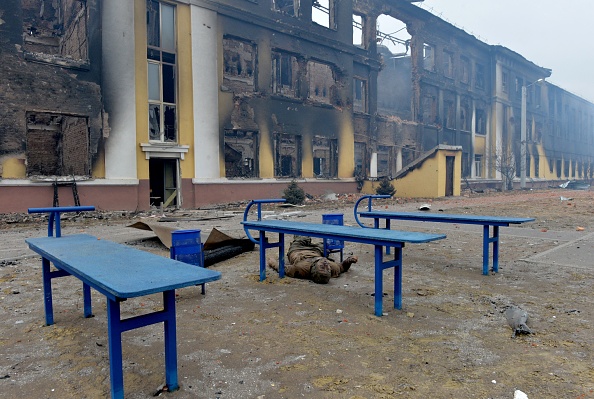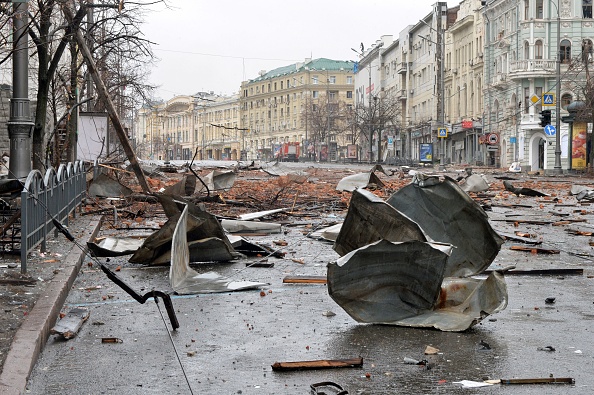Putin warns war will continue ‘until the end’ unless Russia’s terms are met while airstrike kills 22 and talks resume

At least 22 civilians have been killed in a Russian airstrike on the northern Ukrainian city of Chernihiv, Ukraine said, while Ukrainian forces are battling Russian troops for control of Enerhodar, which has Europe’s largest nuclear plant, the city’s mayor told various media outlets.
Meanwhile, Ukraine President Zelensky’s office said this afternoon the second round of talks with the Russians has begun over the war in his country. In Russia, Russia’s second largest – and largest private – firm Lukoil called for “soonest ending of armed conflict,” according to Interfax.
The peace talks began as French President Emmanuel Macron spoke for 90 minutes by phone with Russian President Vladimir Putin this afternoon, who told Macron the war in Ukraine is “going according to plan”, a French official said.
The official at the French Elysee presidential palace said Putin told Macron the invasion will continue “until the end” unless negotiations meet his terms.
The announcement was made while Russian forces seized a strategic Ukrainian seaport and besieged another as part of efforts to cut the country off from its coastline.
The Russian military claimedit had control of Kherson, and local Ukrainian officials confirmed that forces have taken over local government headquarters in the Black Sea port of 280,000, making it the first major city to fall since the invasion began a week ago.
Meanwhile, Hungary’s government is insisting it will not allow any arms shipments bound for neighbouring Ukraine to cross its territory, as the European Union country receives tens of thousands of refugees from the conflict and frets about the reliability of its energy links to Moscow.
A large Hungarian ethnic minority, around 150,000 people, lives in the western Ukrainian region of Transcarpathia, just across the border.
The prime minister’s chief of staff, Gergely Gulyas, says allowing weapons into Ukraine would endanger that minority. He added that some 120,000 refugees fleeing the conflict have crossed into Hungary so far.

Meanwhile, the International Criminal Court (ICC) in The Hague said early this morning it has opened an investigation after 38 countries, including the UK, referred Russia over what the Prime Minister described as “abhorrent” attacks.
The move came as Ukraine’s capital Kyiv braced for a siege while its second-largest city Kharkiv is reeling from strikes this morning and the control of port city Kherson was contested by the Russian military.
While according to the UN refugee agency, one million people have now fled Ukraine – making it the swiftest exodus of refugees this century.
“Don’t stay silent”
Strictly Come Dancing star Nikita Kuzmin, who is from Ukraine
The tally from UNHCR amounts to more than 2 per cent of Ukraine’s population on the move in under a week. The World Bank counted the country’s population at 44 million at the end of 2020.
ICC prosecutor Karim Khan said work would begin “immediately”, with his team already collecting evidence, after the co-ordinated referral freed him to get to work without the need for judicial approval.
UK’s Prime Minister Boris Johnson warned the Russian president he “cannot commit these horrific acts with impunity”.
A second round of talks aimed at ending the fighting was expected on Thursday, but there were little hopes of a breakthrough.
Key developments so far today
- The European Union announced that seven Russian banks were being excluded from the Swift system which allows fast and efficient interbank transactions.
- Ukrainian ambassador to the UK Vadym Prystaiko was given a standing ovation by MPs in the Common
- The Russian defence ministry claimed that Kherson, in the south of Ukraine near the Crimean peninsula annexed by Russia in 2014, was under the “complete control” of Russian soldiers – but the Ukrainian military disputed this.
- The price of oil continued to soar, reaching 112 dollars per barrel, the highest since 2014.
- The lack of progress in meeting the aims of the invasion had led to a change in tactics, focusing on aerial and artillery bombardment of cities rather than the kind of lightning military advances originally envisaged by the Kremlin, Western analysts believe.
Strikes in Kyiv
Strikes that damaged the Babi Yar Holocaust memorial in Kyiv and the central square in Kharkiv have caused revulsion, and Western allies fear it is a sign of a shift in Russian tactics further towards the indiscriminate targeting of urban areas.
Moscow’s international isolation was further displayed when the UN General Assembly voted overwhelmingly to demand it immediately withdraws its military from Ukraine, with 141 nations backing the motion and only five, including alleged co-aggressor Belarus, opposing it.
More than 2,000 civilians have died since the invasion began, Ukraine’s state emergency service said, although that figure has not been independently verified.
Fresh talks today
A second round of talks aimed at ending the fighting was expected on Thursday between Ukraine and Russia, but there appeared to be little common ground between the two sides.

UNHCR, meanwhile, predicted up to 4m people could eventually leave Ukraine but cautioned even that projection could be revised upward.
In an email, UNHCR spokesperson Joung-ah Ghedini-Williams wrote: “Our data indicates we passed the 1M mark” as of midnight in central Europe (11pm London), based on counts collected by national authorities.
UNHCR spokesperson Shabia Mantoo said Wednesday that “at this rate” the outflows from Ukraine could make it the source of “the biggest refugee crisis this century”.
Russia reported its military casualties for the first time since the invasion began last week, saying nearly 500 of its troops have been killed and almost 1,600 wounded.
Ukraine did not disclose its own military losses but said more than 2,000 civilians have died, a claim that could not be independently verified.
With fighting going on on multiple fronts across the country, Britain’s Ministry of Defence said Mariupol, a large port city on the Azov Sea, was encircled by Russian forces, while the status of another vital port, Kherson, a Black Sea shipbuilding city of 280,000, remained unclear.
Russian President Vladimir Putin’s forces claimed to have taken complete control of Kherson, which would make it the biggest city to fall yet in the invasion.
But a senior US defence official disputed that. “Our view is that Kherson is very much a contested city,” the official said.
But the mayor of Kherson, Igor Kolykhaev, said Russian soldiers were in the city and came to the city administration building.
He said he asked them not to shoot civilians and to allow crews to gather up the bodies from the streets.
“I simply asked them not to shoot at people,” he said in a statement.
“We don’t have any Ukrainian forces in the city, only civilians and people here who want to LIVE.”
Mariupol mayor Vadym Boychenko said the attacks there had been relentless.
“We cannot even take the wounded from the streets, from houses and apartments today, since the shelling does not stop,” he was quoted by the Interfax news agency as saying.
Convoy stalled
Meanwhile, the senior US defence official said the immense column of hundreds of tanks and other vehicles appeared to be stalled roughly 25 kilometres (16 miles) from Kyiv and had made no real progress in the last couple of days.
The convoy, which earlier in the week had seemed poised to launch an assault on the capital, has been plagued with fuel and food shortages and has faced fierce Ukrainian resistance, the official said.
On the far edges of Kyiv, volunteer fighters well into their 60s manned a checkpoint to try to block the Russian advance.
“In my old age I had to take up arms,” said Andrey Goncharuk, 68.
He said the fighters needed more weapons, but “we’ll kill the enemy and take their weapons”.
Russia also pounded Kharkiv, Ukraine’s second-largest city with about 1.5 million people, in another round of aerial attacks that shattered buildings and lit up the skyline with balls of fire.
At least 21 people were killed and 112 injured over the past day, said Oleg Sinehubov, head of the Kharkiv regional administration.
Several Russian planes were shot down over Kharkiv, according to Oleksiy Arestovich, a top adviser to Ukrainian President Volodymyr Zelensky.
“Kharkiv today is the Stalingrad of the 21st century,” Mr Arestovich said, invoking what is considered one of the most heroic episodes in Russian history, the five-month defence of the city from the Nazis during the Second World War.
From his basement bunker, Kharkiv mayor Igor Terekhov told the BBC: “The city is united and we shall stand fast.”
Russian attacks, many with missiles, blew the roof off Kharkiv’s five-storey regional police building and set the top floor on fire, and also hit the intelligence headquarters and a university building, according to officials and videos and photos released by Ukraine’s State Emergency Service.
Officials said residential buildings were also hit, but gave no details.
In other developments:
– Russia found itself even more isolated economically as Airbus and Boeing said they would cut off spare parts and technical support to the country’s airlines, a major blow. Airbus and Boeing jets account for the vast majority or Russia’s passenger fleet.